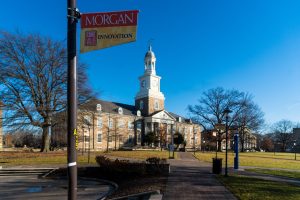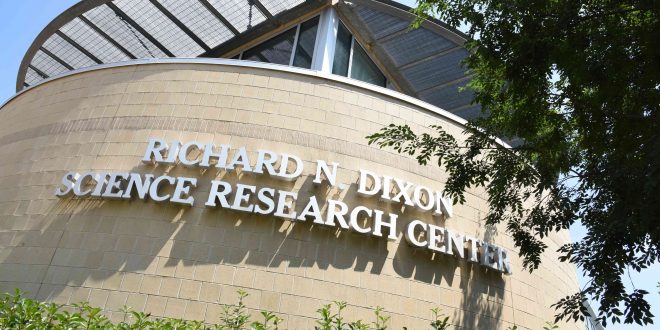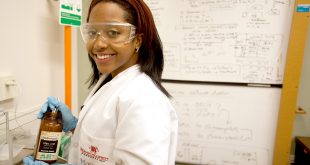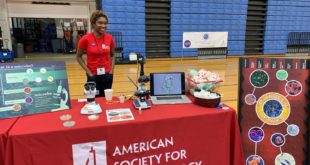 Award Is a First for MSU and Historically Black Colleges and Universities
Award Is a First for MSU and Historically Black Colleges and Universities
Although not widely known, the vast majority of people in the United States use botanical products on a regular basis, either in dietary supplements or as active ingredients of botanical drugs. The chemical components and biological nature of botanical products are often very complex, and the assurance of consistent quality can be challenging for drug developers.
A recent research award of $914,600 from the U.S. Food and Drug Administration’s (FDA’s), Center for Drug Evaluation and Research, Office of Pharmaceutical Quality (OPQ) has put Morgan State University in a prime position to explore the approaches to address these concerns. The two-year research contract will fund the development of a quality control platform by faculty, students and postdoctoral researchers in MSU’s School of Computer, Mathematical and Natural Sciences (SCMNS), to help increase the safety and quality of botanical products by using high-tech processes. The ultimate goal is to optimize the quality of the botanical drug products and dietary supplements available to American consumers.
The FDA research award is the first of its type from the OPQ to an Historically Black College or University (HBCU) and the first award from any source to Morgan for research in this area. The research project and its funding will also form the foundation of a Medicinal Plant Science degree program being developed by the SCMNS, said Hongtao Yu, Ph.D., the dean of the school and co-principal investigator for the OPQ research project at Morgan.
“This program will enable Morgan students to gain valuable experience in an important field of research,” said Dr. Yu. “It will also open additional doors to their potential employment with the FDA.”
 Morgan’s research will take an integrated approach using nuclear magnetic resonance (NMR) and supercritical fluid chromatography/mass spectrometry (SFC/MS) technologies, coupled with chemometric analysis, to meet the challenge, explained Jiangnan Peng, Ph.D., assistant professor in MSU’s Department of Chemistry, and the project’s co-principal investigator.
Morgan’s research will take an integrated approach using nuclear magnetic resonance (NMR) and supercritical fluid chromatography/mass spectrometry (SFC/MS) technologies, coupled with chemometric analysis, to meet the challenge, explained Jiangnan Peng, Ph.D., assistant professor in MSU’s Department of Chemistry, and the project’s co-principal investigator.
“This multidisciplinary program will provide training opportunities for two postdoctoral fellows, two graduate students and several undergraduate students,” said Dr. Peng, who was trained in traditional Chinese medicine and botanical medicine in China. “Each participant will have this unique opportunity to learn FDA’s regulations on drug quality and expand their knowledge horizon by collaboration across different disciplines. The research will also raise the university’s profile and enhance its reputation in the field, which will benefit further collaborative research and career opportunities for our students.”
Morgan has continued its more than century-long record of outstanding achievement in the liberal arts while building its reputation as a science, technology, engineering and mathematics (STEM) standout. Today, nearly 17 percent of Morgan alumni are employed in the STEM fields, versus 11 percent for all Maryland institutions of higher education. Recent highlights of the increased grant funding fueling this trend include $35 million in new awards from the National Institutes of Health to advance biomedical research and workforce development through several programs including Morgan’s ASCEND program and the RCMI@Morgan, a Center to reduce urban health disparities; a $0.5-million Excellence in Research grant from the National Science Foundation (NSF) to study the role of nanoparticles in cyanobacterium for enhanced biofuel production; and a $1.25-million grant from the NSF to increase retention of STEM majors at Morgan, namely the PERSIST Program.
In 2018, the Carnegie Classification of Institutions of Higher Education elevated Morgan to R2 status, a designation reserved for doctoral universities with high research activity. MSU is one of only 130 universities nationwide with an R2 designation.
The School of Computer, Mathematical and Natural Sciences comprises five departments: Biology (including the Medical Laboratory Science Program), Chemistry, Computer Science, Mathematics (including the Actuarial Science Program) and Physics (including Engineering Physics). The school also offers three master’s degrees — Bioinformatics, Mathematics and Science (Biology, Chemistry and Physics) — and two Ph.D. degrees: Bioenvironmental Science and Industrial & Computational Mathematics. Its mission is to provide a comprehensive offering of programs that will educate and nurture the next generation of scientists, mathematicians and technologists while advancing the frontiers of science and technology through scientific research and innovation in service to local, regional and global communities.
About Morgan
Morgan State University, founded in 1867, is a Carnegie-classified doctoral research institution offering more than 125 academic programs leading to degrees from the baccalaureate to the doctorate. As Maryland’s Preeminent Public Urban Research University, Morgan serves a multiethnic and multiracial student body and seeks to ensure that the doors of higher education are opened as wide as possible to as many as possible. For more information about Morgan State University, visit www.morgan.edu.
MEDIA CONTACT(S):
Larry Jones or Dell Jackson, University PR
(443) 885-3022
 Morgan State University Newsroom Morgan State University
Morgan State University Newsroom Morgan State University





